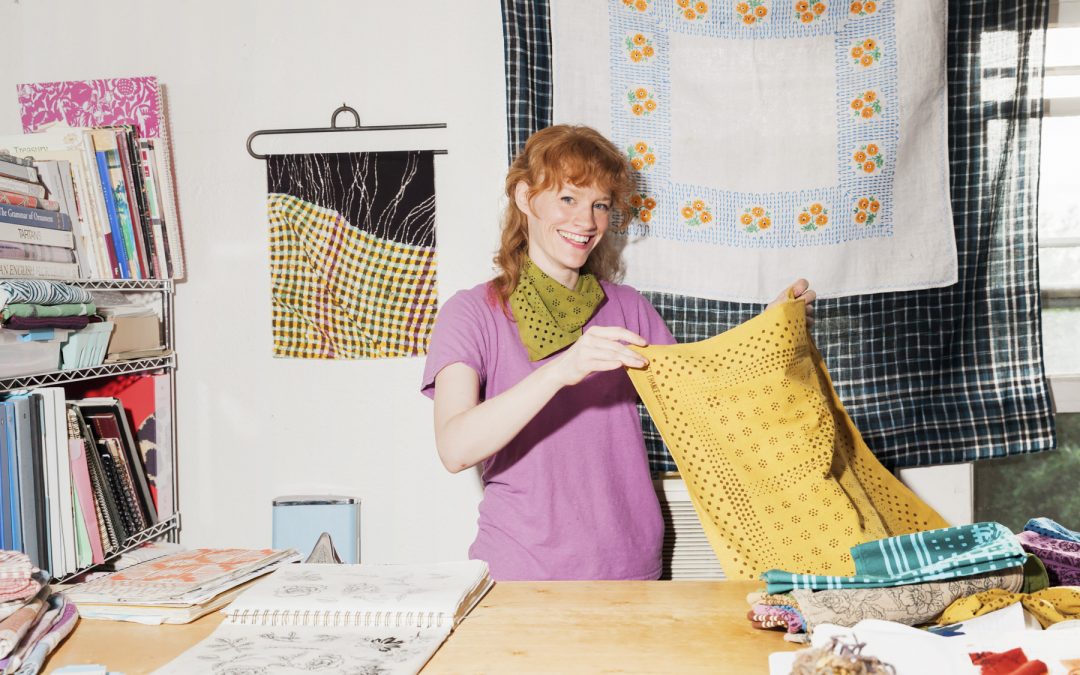Lindsey Fout photographed in her studio. Photo courtesy of Last Chance Textiles
We’d like to use this week’s Community Spotlight to formally welcome Lindsey Fout, owner and operator of Last Chance Textiles (LCT), to the Portland textile community. Lindsey recently moved her life and business from Los Angeles to SE Portland, but she grew up in West Virginia surrounded by the cultural heritage of rural Appalachia. Last Chance Textiles has rejuvenated an iconic facet of North American cowboy culture—the bandana—an accessory that is stylish, dependable, and versatile. Lindsey has set her craft apart by incorporating natural-dying techniques from around the world into her fabrication process.
In her spare time, Lindsey has been organizing raffles with other textilers on social media to support philanthropic initiatives, such as the Feeding America COVID-19 Response Fund. As a local contributor to “Crafters Against COVID-19,” she’s been using deadstock material to produce and donate masks to those in need, and posting instructional videos explaining how to use a bandana as a “no-sew” cotton mask in a pinch.
Last Chance Textiles is still fulfilling online orders, and Lindsey is offering no-contact, curbside pick-up from her studio in SE Portland.
Has Last Chance Textiles been affected by the outbreak of COVID-19?
Last Chance Textiles has been affected in some contrasting ways. I’m based out of my home studio here in Southeast Portland and am able to continue my work/life routine without too much interruption, although it still feels different somehow. I’ve been able to continue fulfilling ecommerce orders and have even seen a slight bump in bandana sales since the CDC recommended face coverings. On the flip side, I have a lot of money tied up in production and the supply chain right now with no clue when those investments will shake loose and refill a dwindling inventory. Last Chance Textiles is horizontally integrated, meaning I rely on other very small businesses and individuals to help me make products. Falling so far behind will certainly make my goals for sales and growth planned for 2020 impossible at this point. The best case scenario is to stay afloat and hope all of my vendors and production partners survive as well.
Do you anticipate that this outbreak will require you to restructure your business in the near future?
Most likely, but I honestly don’t know what that will look like. Last Chance Textiles has funded its own growth from the beginning, so has gone through numerous phases of restructuring as I’ve scaled and figured out how to run a business. While I don’t know much about business strategy and was certainly unprepared for a global pandemic, I’ve been leaning into my tenacity and grit and feel open to adaptation.
How do you hope to continue to provide your goods and services to your community as this crisis develops?
I’m happy to say that for the time being I have bandanas in stock that can be used as face coverings and feel thankful that the USPS is still going strong. If you’re in Portland, I can provide a local no-contact pick up. If I run out of bandanas, perhaps my skills as an educator will help keep me relevant as a brand and artist. Maybe some online workshops or demos? I don’t quite have that all figured out, but it will be something I’m likely to pursue if this goes on for much longer.
Author:
Sebastian Zinn has a B.A. in Comparative Literature with an allied field in Art History from Reed College. Since graduating in the Spring of 2018, he has been working as a freelance writer and editor covering a diverse range of topics, including visual and performance art, fashion, literature, film, music, healthcare and economics. He is currently producing social media and blog content for Portland Textile Month.

